My Take on “How to Win A Job Interview”
On Thursday night 27th May, I attended a very interesting SOLS class called “How to Win a Job Interview” on Google meet. As a student who has never attended any job interview, I am a noobie that could get really nervous thinking about my future job interview. Now more than ever as my internship and graduation date are nearing. I think most of the students in the same batch of me also faced this problem. Therefore, I would like to share my notes on the things I had learned from “How to Win A Job Interview”
What is job interview?
What do you think a job interview is? Why is it so important and why are we always so stressed about it? Well, a job interview is a two-way conversation to help the interviewer and the candidates to understate one another, for the interviewer to understand the personality and the qualification of the candidate, and for the candidate to know more about the company and whether this is the kind of the company they want to work with. A job interview is like a matching process so that the interviewer and the candidate can find the person that fits each other requirements.
There are six types of interview
- Screening
Screening is a type of short fast interview about qualifying a candidate. There may be fifty or more CVs submitted for a certain job and that company will do a fast screening to chooses a qualifying CV.
- Behavioral Interview
It is an interview to understand more about your personalities and attitude in work with questions such as; ‘Tell me about yourself or ‘Tell me about your CV’
- Competency
Competency interviews will test more on your knowledge about a certain field your job specialized in.
- Case study
It is a professional-level interview. There will be a scenario where you are given a problem, for example, you are applying to be a consultant, so you will be given a question that tests your in-depth problem solving and knowledge about that certain topic
- Panel
Panel is a type of interview where more than one interviewer would ask all kinds of questions. This type of interview is reserved for a very senior position like a general manager.
- Open Interview
This is a type of interview with an informal way of asking and understanding. For example like a graduate open day.
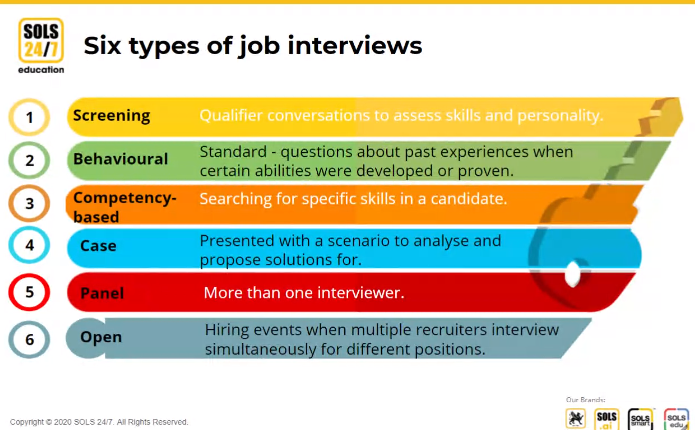
How to prepare for jon interview
- Read the job description
For example, if you want to apply for a job in a big company, you need to know what the job entails. By knowing that, you will know what you are the things you need to prepare or pay attention to. - Research about the company and the position
They would love to know that the candidates are committed and really understand the company. Therefore, you need to do research and understand more about the role or the job you are applying for and the fields related. - Understanding why you as a candidate will be a good fit for that position
You need to understand what makes you so special, what makes you a good person for that team, and whether you have the ambition to do that and bring value to the employer. - Assessing the job benefits
You need to know how much you are going to be compensated for the job you are applying for. How much you get base on the overall standard, and how much you will get from that company. - Research standard interview question
The interviewer usually has a set of ten to fifteen questions, for example: “tell me about yourself”, “please guide me through your CV”, or other similar questions. You can research on Google “standard question of job interviews in Malaysia” so you can train and prepare yourself. Sometimes there will also be different questions such as, “If you don’t succeed in this interview, what are your backup plan” or others. Therefore you have to be fully prepared with a complete game plan to answer their set of questions. - Practicing
It would be very beneficial to practice. So although you are nervous during the interview later, you still can subconsciously answer the questions in a smooth fluid manner.
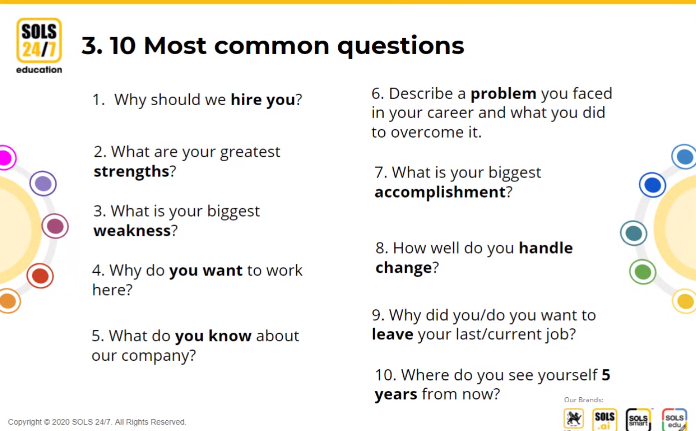
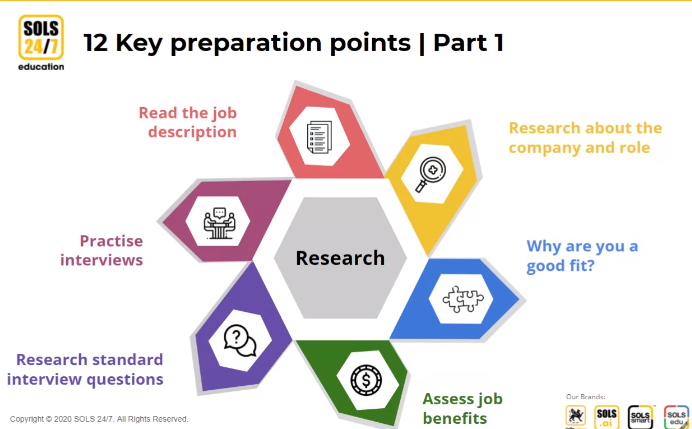
- Your question
Typically at the end of a face-to-face interview, you will be given time to ask questions. There is no limit on what kind of questions you can ask. Maybe there are so many things you find online, but you have this certain thing that you really want to know from the company. In such cases, this will be a perfect time for you to ask your question. You can also ask other questions like what kind of challenges the company faces or about the culture of that company. Just take note that, “sorry, I got no question” is the last thing you can say there! It will possibly make the interviewer think that you are an arrogant person or that you don’t care about the company at all! - print hardcopy of relevant documents
Always make sure that you bring a hard copy of your own CV. So in the case that the interview suddenly lost or forgot and ask you to share your CV with him or her, You can give it readily. - Plan attire and body language
It is best that the way that you dress or present yourself matches the type of interview you are going to and the formal attire of that company. For example, if the formal attire of that company is just a polo shirt, then wearing that will suffice. Besides that, you also need to pay attention to your body language. You have to show you are energetic and you have passion for that position. Sitting upright and look into the interviewer’s eyes during the interview is a good way to go. - Travel managements
Never ever arrived late during a job interview, you have to be at least 15 minutes early before the interview starts. You have to plan your travel time and consider the traffic jam that may happen on the road. Give an impression to the employer that you are punctual and good with time management. - Plan a key point to sell yourself
It means to market yourself to be that desirable person. It’s about putting up the right show, saying the right point. It’s about how you present yourself, how you talk with the receptionist, and how you greet people in the hallways. You have to show that you are Interested in being approachable. Always smile and says things like, “how are you” or “nice to meet you today
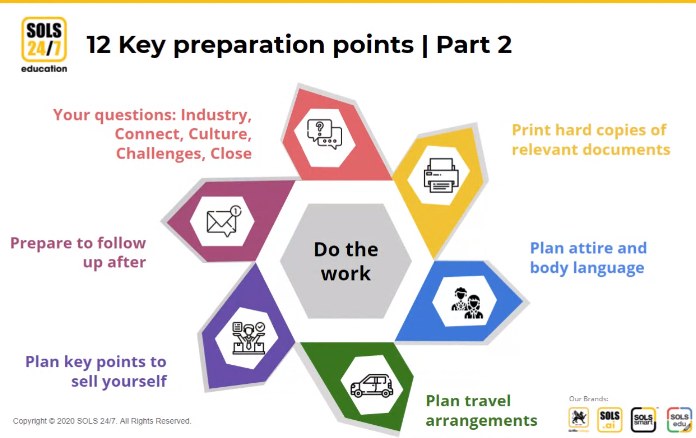
Substages to face to face interview
- The waiting time
Be kind to everyone around you during the waiting time. Don’t be too shy or too timid. It is better to show that you’re confident, like showing it from the way you walk into the office and greets everyone. - Pleasantry
Make small talks and build a connection with the people you met. Make an effort to know the people around you. - Introduction
At the start of the interview, you will be given around five minutes to talk about yourself. It is basically like giving a full picture of yourself and your story. The best way to do it is to go straight to the key point, who you are, where did you last work, what were your job there, or if you were a student, what kind of activities or leadership you did, and why did you decide to come here. You can also explain things such as; What are your good values, or why you think you are a good person for that position. - Interviewer
Their interviewer will give around ten to fifteen questions. It is designed to understand the candidate in front of them. Interviews are usually conducted in forty-five minutes to one house, so you have around three to five minutes to answer each question. You don’t have to be too compelled to finish early but also don’t drag it too long. - Interviewee
The interviewee will be given time to ask their question after the interviewer is done with theirs. During this time, you can ask questions to show that you are motivated. You can also ask clarification questions, so it shows that you were listening to the interviewer. A Big NO NO during this session; do not say that you don’t have any question, do not ask about how much money this job give (it will make the interviewer think you only join because of the money and not because you believe in their company), don’t ask questions like “so am I accepted or not?” or “so tell me, how did I do in the interview?”, and don’t give generic question which answers you can find in Google. - Wrap up
Is where this all end. As a candidate, say your gratitude such as, “thank you for the advantage of this interview, I have fun talking about this and that”. You can also ask about the procedure that will happen after the interview.
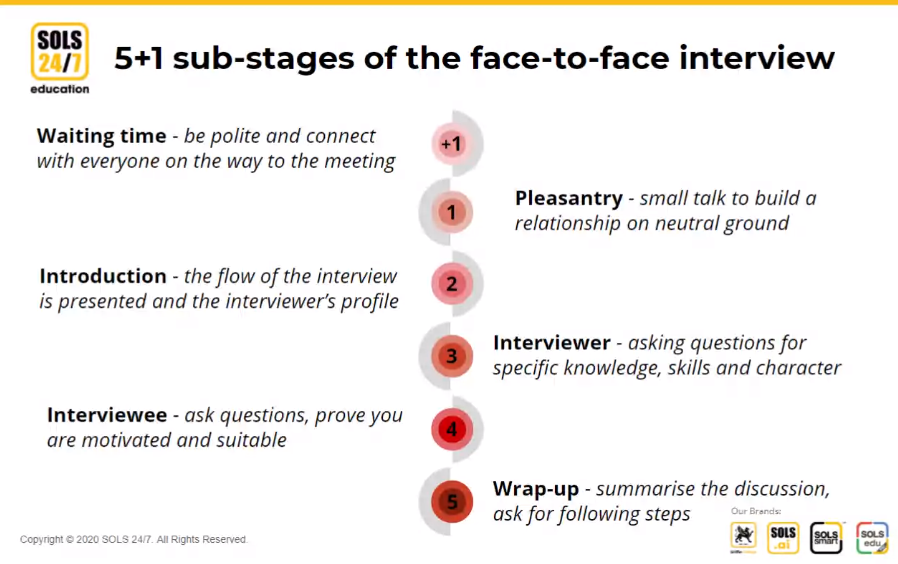
Most important thing to note during an interview is to stay honest. However, don’t be too honest! You have to know when to stop and when honesty cross to stupidity. Don’t give too much information until you are being taken advantage on! Besides that, I wish this information will benefit you all!
